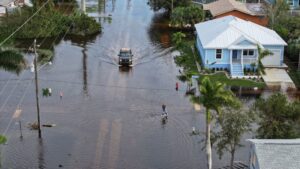Get Prepared: A Comprehensive Guide to Securing Your Home Before Hurricane Season
As the storm clouds gather, it’s essential to ensure that your home and finances are as secure as possible, especially during an active hurricane season. At Extreme Investor Network, we believe that preparation is key to weathering any financial storm. With forecasts predicting an increase in hurricane activity this year, it’s time to review your homeowners insurance policy and make sure you’re equipped for the worst. Here’s a deep dive into the crucial steps you need to take.
The Importance of a Proactive Approach
The National Oceanic and Atmospheric Administration (NOAA) is forecasting a 60% chance of "above-normal" activity for the Atlantic hurricane season, with predictions of 13 to 19 named storms and 6 to 10 hurricanes, at least 3 of which could escalate to major hurricanes (Categories 3, 4, or 5). Historical data shows that past seasons have resulted in billions of dollars in damages—just last year, property damage and economic losses reached a staggering $500 billion. That’s why taking proactive steps is not just smart, but essential.
1. Review Your Policy Limits
The first step in ensuring your home is protected is to scrutinize your policy limits. This figure represents the maximum amount your insurance provider will pay for covered losses. Make sure this limit covers the current cost of rebuilding your home.
For example, if your home spans 2,000 square feet and local construction costs are around $250 per square foot, your policy limit should ideally be at least $500,000. However, if construction costs have risen or if you’ve made renovations that aren’t reflected in your current coverage, you may find yourself underinsured.
Key Insight: Recent statistics show that construction labor costs have risen by over 36% in the last five years, and material costs have skyrocketed by nearly 43%. So, recalibrating your policy to align with current market values is vital.
2. Check Your Deductibles
Your deductible is the amount you pay out of pocket before your insurance kicks in. Understanding this can significantly impact your financial planning. For instance, if you have a $1,000 deductible and you file a claim for $8,000 worth of damages, you’ll be responsible for paying the first $1,000.
If you choose to raise your deductible—say from $1,000 to $2,500—you could reduce your policy premium by up to 12%. However, make sure you have enough cash reserves to cover this increased deductible if a claim arises.
Action Item: Look beyond your standard deductible to any hazard-specific provisions, like a separate wind deductible. This could escalate your out-of-pocket costs dramatically, especially for hurricane damage.
3. Assess Your Flood Insurance Needs
It’s crucial to note that traditional homeowners insurance often doesn’t cover flood damage. Given that flooding causes 90% of disaster damage each year in the U.S., you may want to consider purchasing a separate flood insurance policy, either through the National Flood Insurance Program (NFIP) or a private insurer.
Even if you live in a region not typically associated with flooding, this insurance is a wise investment. For example, during Hurricane Helene, significant flooding occurred in mountainous regions like Asheville, NC, where only 1% of homes were covered by NFIP insurance.
Important Tip: If you decide to opt for flood insurance through NFIP, don’t wait until a storm is imminent. There is usually a 30-day waiting period for new policies to take effect.
Final Thoughts
Preparing for an active hurricane season requires diligence and proactive measures. By reviewing your homeowners insurance policy, understanding your deductibles, and considering the need for flood insurance, you can better protect your home and your finances.
At Extreme Investor Network, we’re committed to empowering you with the knowledge and tools you need to make informed financial decisions. Make the most of this hurricane season by ensuring your home is safeguarded against storms—both literal and financial.
Stay alert, stay prepared, and above all, stay smart with your investments. Take action today to secure your peace of mind for tomorrow.

